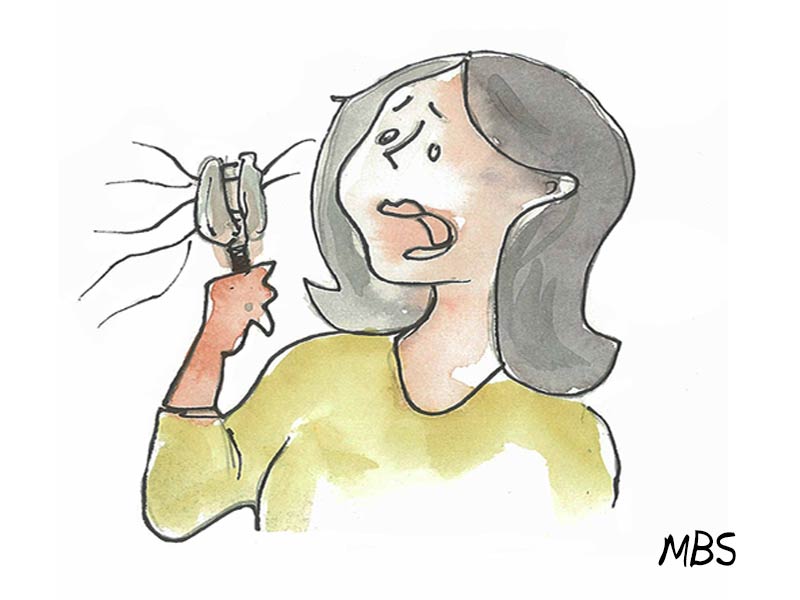How to Avoid Hair Loss After Weight-Loss Surgery?
Medically Reviewed by Katelyn J. Mock, US-Registered Dietician (R.D.)
The American Society for Metabolic and Bariatric Surgery (ASMBS) says that it is common to lose hair after surgery. This occurs approximately 2-3 months after a trigger and can last up to 6 months. [1]“Bariatric Surgery FAQs.” American Society for Metabolic and Bariatric Surgery,
View in Article
Normally replenishing nutrients in the body can reverse the condition.

It is normal to shed about 30-150 hairs in a day. The hair regrows, so the volume of hair remains constant. [2]British Association of Dermatologists, Patient Information Leaflets (PILs). “Telogen Effluvium (A Type of Hair Loss)” 30 July 2018.
View in Article
Hair loss after bariatric surgery is not permanent. Although it takes time to restore the original thickness of the hair, it re-grows after some time.
What is Telogen Effluvium?

Telogen Effluvium is the condition of losing hair for a short while after bariatric surgery.
The Process
- Hair grows in two phases: Anagen (hair growth) and Telogen (inactive).
- Every hair enters the Anagen phase in the beginning and grows for some time.
- It moves into the Telogen phase.
- The hair falls out after about 100-120 days in the Telogen phase.
- In bariatric patients, this process accelerates and is called Telogen Effluvium. [3]Silvia Leite Faria, MS; Orlando Pereira Faria, MD; Renato Diniz Lins, MD; and Heloisa Rodrigues de Gouvea, Bariatric Times. 2010;7(11):18–20.
View in Article
It is the second-most common cause of hair loss.[4]American Hair Loss Association, “Types of Hair Loss – Introduction”
View in Article This condition is indicated by nonscarring hair loss.[5]Yavuz, Ibrahim Halil et al. “Assessment of Heavy Metal and Trace Element Levels in Patients with Telogen Effluvium.” Indian Journal of Dermatology 3 (2018): 246–250. PMC. Web. 30 July 2018.
View in Article
Bariatric surgery limits the absorption of nutrients. Watch out for symptoms of malnutrition after gastric bypass surgery.
The human body prioritizes vital organs over the hair; therefore, the hair follicle doesn’t receive enough nutrients, which results in hair loss.
Telogen Effluvium does not damage the hair follicles. The hair grows back gradually. [6]Weight-loss Surgery, Nutrition and Hair Loss by Jacqueline Jacques, ND “Weight Loss Surgery Nutrition and Hair Loss“
View in Article
Doctors advise their patients to keep a positive attitude with a healthy diet.
What Causes Telogen Effluvium?
As a weight loss surgery patient, one may experience hair loss due to stressors like
- major surgery
- anesthesia
- physical trauma
- a sudden change in diet
- rapid weight loss
Reports suggest that hair loss after surgery is common but not the cause of baldness.[7]Ruiz-Tovar J, Oller I et al. “Hair Loss in Females After Sleeve Gastrectomy: A Predictive Value of Serum Zinc and Iron Levels” The American Surgeon 80
View in Article
Early hair loss prevention is not always possible after weight loss surgery.
It is important to know that this is a temporary condition. This hair loss can be subtle or happen suddenly. In most cases, the hair does grow back.[8]Harvard Health Publishing, Harvard Medical School. “Telogen Effluvium.” 30 July 2018.
View in Article
It is crucial to be regular with your supplements and consume the required amount of protein daily.[9]Guo, Emily L., and Rajani Katta. “Diet and Hair Loss: Effects of Nutrient Deficiency and Supplement Use.” Dermatology Practical & Conceptual1 (2017): 1–10. PMC. Web. 30 July 2018.
View in Article
Tips to Manage Hair Loss

Take ample quantities of vitamins, minerals, and protein to ensure your hair grows back again. This may prevent thinning of hair further.
It is possible that the nutrients related to hair loss are protein, iron, zinc, essential fatty acids, vitamin B12, and biotin. [3]Silvia Leite Faria, MS; Orlando Pereira Faria, MD; Renato Diniz Lins, MD; and Heloisa Rodrigues de Gouvea, Bariatric Times. 2010;7(11):18–20.
View in Article
Protein and biotin won’t prevent the hair loss that happens right after bariatric surgery. However, they are vital for other reasons/body functions.
Hair should re-grow as the patient heals from the trauma over time. This could be faster through proper nutrient balance after surgery.
A patient is advised to go for a 6-week/6-month/annual post-op blood work for proper assessment.
Symptoms of Hair Loss to watch out for
- Hair continues to fall for more than a year after surgery.
- Blood tests indicate low levels of iron, zinc, or protein.
- Difficulty in tolerating protein-rich foods, vitamins, and mineral supplements.
Things to Do Every Day
- One of the best ways to prevent continued hair loss is to maximize nutrition
- Eat a balanced diet in small quantities. Don’t skimp out on proteins.
- A minimum of 60 to 75 gm of protein per day is required to heal rapidly and ensure proper bodily functions.
- Do include vitamins and mineral supplements in your diet.
- Set a good sleep pattern.
- De-stress (Long baths do wonders!)
- Be regular with supplements
Hang in there!
Our US-RD answers a client’s question
Question – How long does the hair fall after bariatric surgery last? I’ve lost a lot of hair recently. I’ve been taking biotin for it. Will it help?
Hair loss is something that a lot of people go through. It typically begins around week 6 through 12, post-op. This period coincides with the post-op low-calorie diet. This diet may prevent people from reaching their protein goals. Thus, it is frequently and automatically assumed that the two are related. However, this very well may NOT be the case.
Losing hair after bariatric surgery is called Telogen Effluvium and is usually related to emotional or physical stress/changes that the body experiences and not from a lack of protein, vitamins, or minerals. Hair loss typically slows at 4-6 months after surgery, and unfortunately, always seems to take longer to grow back than it did to lose it. The good news is that it will come back with time.
If you continue to have significant hair loss for one year after surgery or the hair loss begins 6 months or more after surgery, it may be related to a nutritional issue, and in that case, it is a good idea to reach out to me or your physician to help determine a cause and course of action. To help decrease your risk of nutritional hair loss, start taking your recommended vitamins immediately after surgery. If you have tolerance issues, please let me know, and I can assist you. While we typically focus on reducing calorie intake, it is important to make sure that you are getting enough calories. At 3 months post-op, most individuals will be eating around 1,000 calories per day and should be having 60gm protein.
This Post Addresses
- Hair loss after Gastric Bypass
- Hair loss 5 five years post-bariatric surgery
- How to prevent hair loss after weight loss surgery?
- No hair loss after Gastric Sleeve
References
- “Bariatric Surgery FAQs.” American Society for Metabolic and Bariatric Surgery, https://asmbs.org/patients/bariatric-surgery-faqs
- British Association of Dermatologists, Patient Information Leaflets (PILs). “Telogen Effluvium (A Type of Hair Loss)” 30 July 2018.
- Silvia Leite Faria, MS; Orlando Pereira Faria, MD; Renato Diniz Lins, MD; and Heloisa Rodrigues de Gouvea, Bariatric Times. 2010;7(11):18–20. “Hair loss among bariatric surgery patients.”
- American Hair Loss Association, “Types of Hair Loss – Introduction”
- Yavuz, Ibrahim Halil et al. “Assessment of Heavy Metal and Trace Element Levels in Patients with Telogen Effluvium.” Indian Journal of Dermatology 3 (2018): 246–250. PMC. Web. 30 July 2018.
- Weight-loss Surgery, Nutrition and Hair Loss by Jacqueline Jacques, ND “Weight Loss Surgery Nutrition and Hair Loss“
- Ruiz-Tovar J, Oller I et al. “Hair Loss in Females After Sleeve Gastrectomy: A Predictive Value of Serum Zinc and Iron Levels” The American Surgeon 80
- Harvard Health Publishing, Harvard Medical School. “Telogen Effluvium.” 30 July 2018.
- Guo, Emily L., and Rajani Katta. “Diet and Hair Loss: Effects of Nutrient Deficiency and Supplement Use.” Dermatology Practical & Conceptual1 (2017): 1–10. PMC. Web. 30 July 2018.
{
“@context”: “https://schema.org”,
“@type”: “QAPage”,
“mainEntity”: {
“@type”: “Question”,
“name”: “How to Cope with Hair Loss After Weight-Loss Surgery?”,
“text”: “The American Society for Metabolic and Bariatric Surgery (ASMBS) says that it is common to lose hair after surgery. This occurs approximately 2-3 months after a trigger and can last up to 6 months.”,
“answerCount”: 1,
“dateCreated”: “2019-08-10”,
“author”: {
“@type”: “Person”,
“name”: “Aranza”
},
“acceptedAnswer”: {
“@type”: “Answer”,
“text”: “Take ample quantities of vitamins, minerals, and protein to ensure your hair grows back again. This may prevent thinning of hair further.
It is possible that the nutrients related to hair loss are protein, iron, zinc, essential fatty acids, vitamin B12, and biotin.
Protein and biotin won’t prevent the hair loss that happens right after bariatric surgery. However, they are vital for other reasons/body functions.
Hair should re-grow as the patient heals from the trauma over time. This could be faster through proper nutrient balance after surgery.
A patient is advised to go for a 6 week/6 month/annual post-op blood work for proper assessment.
Symptoms of Hair Loss to watch out for
Hair continues to fall for more than a year after surgery.
Blood tests indicate low levels of iron, zinc or protein.
Difficulty in tolerating protein-rich foods, vitamins and mineral supplements.”,
“upvotecount”: 1,
“dateCreated”: “2019-08-12”,
“url”: “https://staging.mexicobariatricservices.com/knowledgebase/article/nausea-after-bariatric-surgery-what-to-do/”,
“author”: {
“@type”: “Organization”,
“name”: “Mexico Bariatric Services”
}
}
}
}

